Describe Teachers' Lesson Sequencing, Student Learning, and Strategies
VerifiedAdded on 2023/06/11
|5
|1219
|95
Report
AI Summary
This report delves into the critical aspects of effective teaching, focusing on how teachers sequence their lessons to maximize student learning. It emphasizes the importance of understanding student learning, content knowledge, and the application of various teaching strategies. The report highlights core values such as dignity, fairness, responsibility, freedom, and truthfulness as essential for maintaining high teaching standards. It explores different teaching methods, including classroom discussions, feedback systems, and online learning platforms, to enhance teacher effectiveness and student outcomes. The report also touches upon managerial teaching strategies and the integration of technology in education to promote a comprehensive and adaptable learning environment. The author references several academic sources to support the concepts discussed.
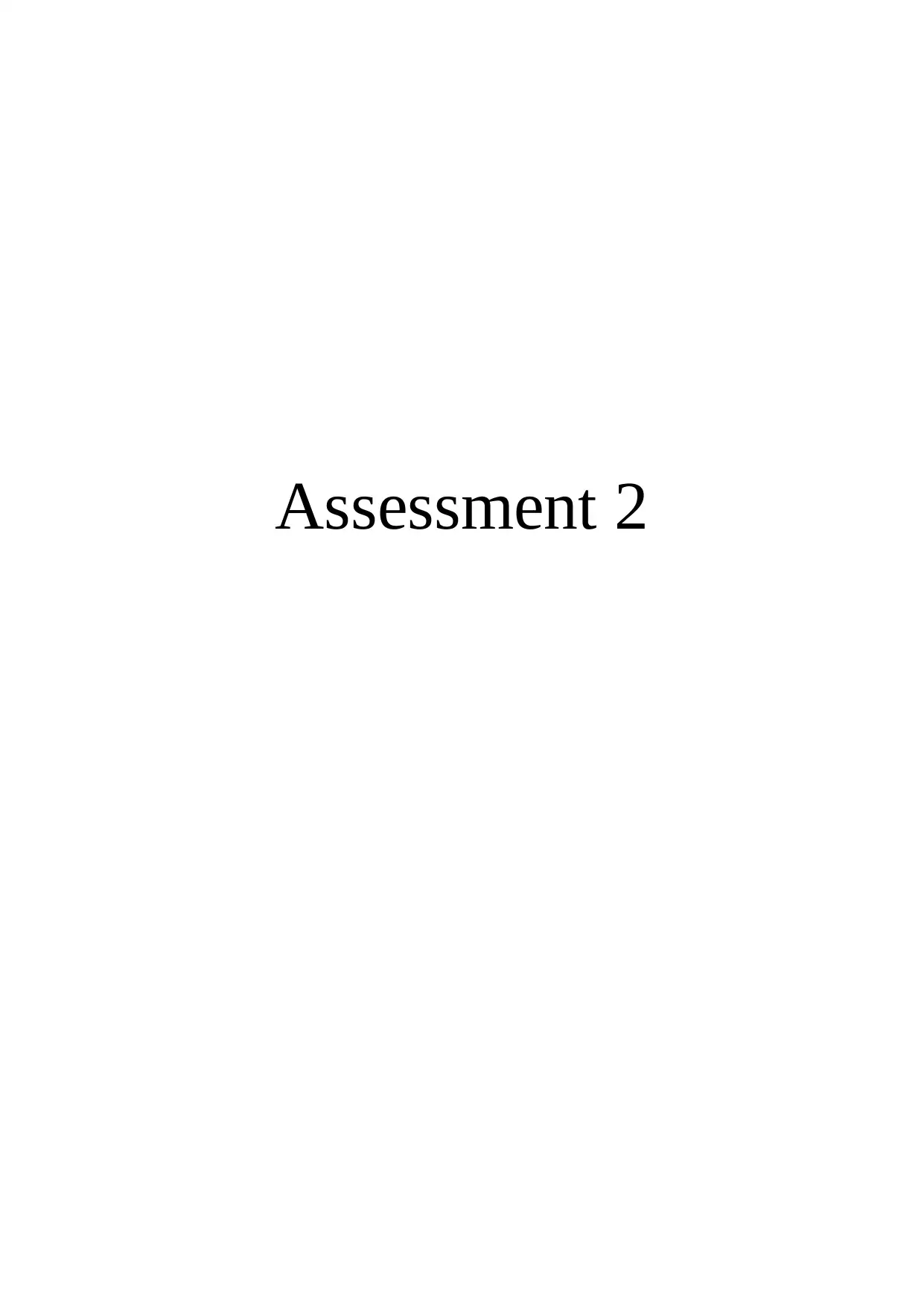
Assessment 2
Paraphrase This Document
Need a fresh take? Get an instant paraphrase of this document with our AI Paraphraser
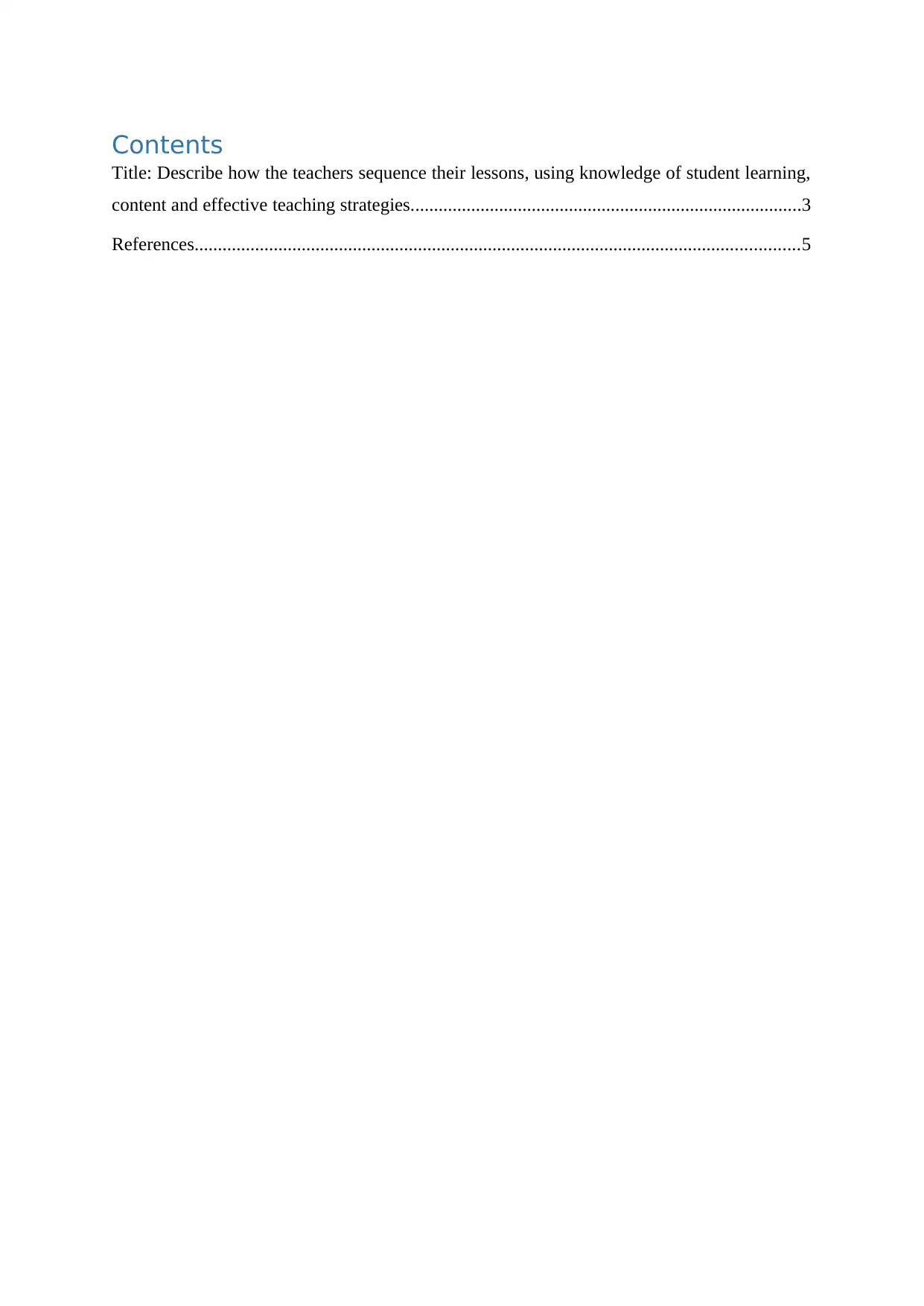
Contents
Title: Describe how the teachers sequence their lessons, using knowledge of student learning,
content and effective teaching strategies....................................................................................3
References..................................................................................................................................5
Title: Describe how the teachers sequence their lessons, using knowledge of student learning,
content and effective teaching strategies....................................................................................3
References..................................................................................................................................5
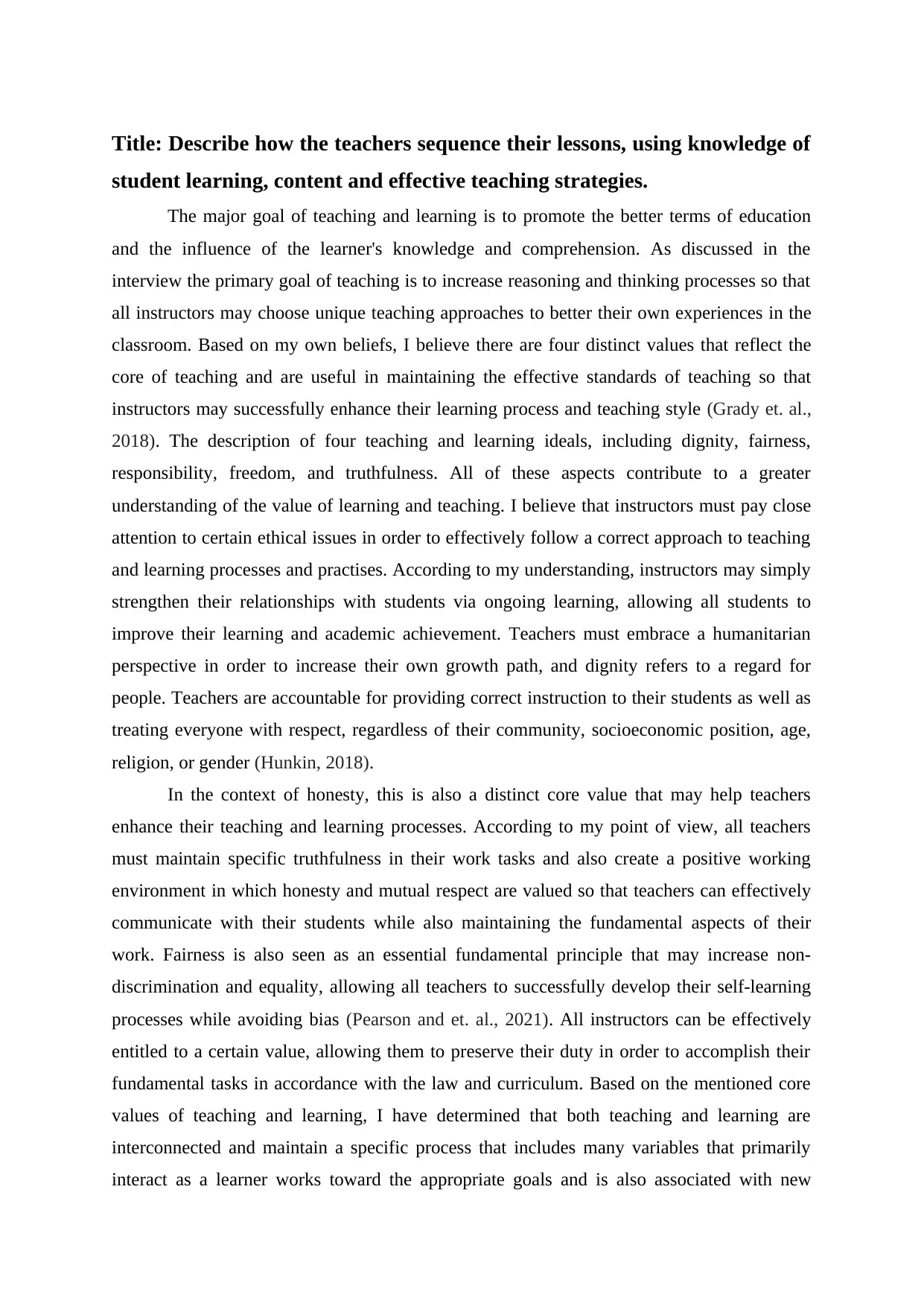
Title: Describe how the teachers sequence their lessons, using knowledge of
student learning, content and effective teaching strategies.
The major goal of teaching and learning is to promote the better terms of education
and the influence of the learner's knowledge and comprehension. As discussed in the
interview the primary goal of teaching is to increase reasoning and thinking processes so that
all instructors may choose unique teaching approaches to better their own experiences in the
classroom. Based on my own beliefs, I believe there are four distinct values that reflect the
core of teaching and are useful in maintaining the effective standards of teaching so that
instructors may successfully enhance their learning process and teaching style (Grady et. al.,
2018). The description of four teaching and learning ideals, including dignity, fairness,
responsibility, freedom, and truthfulness. All of these aspects contribute to a greater
understanding of the value of learning and teaching. I believe that instructors must pay close
attention to certain ethical issues in order to effectively follow a correct approach to teaching
and learning processes and practises. According to my understanding, instructors may simply
strengthen their relationships with students via ongoing learning, allowing all students to
improve their learning and academic achievement. Teachers must embrace a humanitarian
perspective in order to increase their own growth path, and dignity refers to a regard for
people. Teachers are accountable for providing correct instruction to their students as well as
treating everyone with respect, regardless of their community, socioeconomic position, age,
religion, or gender (Hunkin, 2018).
In the context of honesty, this is also a distinct core value that may help teachers
enhance their teaching and learning processes. According to my point of view, all teachers
must maintain specific truthfulness in their work tasks and also create a positive working
environment in which honesty and mutual respect are valued so that teachers can effectively
communicate with their students while also maintaining the fundamental aspects of their
work. Fairness is also seen as an essential fundamental principle that may increase non-
discrimination and equality, allowing all teachers to successfully develop their self-learning
processes while avoiding bias (Pearson and et. al., 2021). All instructors can be effectively
entitled to a certain value, allowing them to preserve their duty in order to accomplish their
fundamental tasks in accordance with the law and curriculum. Based on the mentioned core
values of teaching and learning, I have determined that both teaching and learning are
interconnected and maintain a specific process that includes many variables that primarily
interact as a learner works toward the appropriate goals and is also associated with new
student learning, content and effective teaching strategies.
The major goal of teaching and learning is to promote the better terms of education
and the influence of the learner's knowledge and comprehension. As discussed in the
interview the primary goal of teaching is to increase reasoning and thinking processes so that
all instructors may choose unique teaching approaches to better their own experiences in the
classroom. Based on my own beliefs, I believe there are four distinct values that reflect the
core of teaching and are useful in maintaining the effective standards of teaching so that
instructors may successfully enhance their learning process and teaching style (Grady et. al.,
2018). The description of four teaching and learning ideals, including dignity, fairness,
responsibility, freedom, and truthfulness. All of these aspects contribute to a greater
understanding of the value of learning and teaching. I believe that instructors must pay close
attention to certain ethical issues in order to effectively follow a correct approach to teaching
and learning processes and practises. According to my understanding, instructors may simply
strengthen their relationships with students via ongoing learning, allowing all students to
improve their learning and academic achievement. Teachers must embrace a humanitarian
perspective in order to increase their own growth path, and dignity refers to a regard for
people. Teachers are accountable for providing correct instruction to their students as well as
treating everyone with respect, regardless of their community, socioeconomic position, age,
religion, or gender (Hunkin, 2018).
In the context of honesty, this is also a distinct core value that may help teachers
enhance their teaching and learning processes. According to my point of view, all teachers
must maintain specific truthfulness in their work tasks and also create a positive working
environment in which honesty and mutual respect are valued so that teachers can effectively
communicate with their students while also maintaining the fundamental aspects of their
work. Fairness is also seen as an essential fundamental principle that may increase non-
discrimination and equality, allowing all teachers to successfully develop their self-learning
processes while avoiding bias (Pearson and et. al., 2021). All instructors can be effectively
entitled to a certain value, allowing them to preserve their duty in order to accomplish their
fundamental tasks in accordance with the law and curriculum. Based on the mentioned core
values of teaching and learning, I have determined that both teaching and learning are
interconnected and maintain a specific process that includes many variables that primarily
interact as a learner works toward the appropriate goals and is also associated with new
⊘ This is a preview!⊘
Do you want full access?
Subscribe today to unlock all pages.

Trusted by 1+ million students worldwide
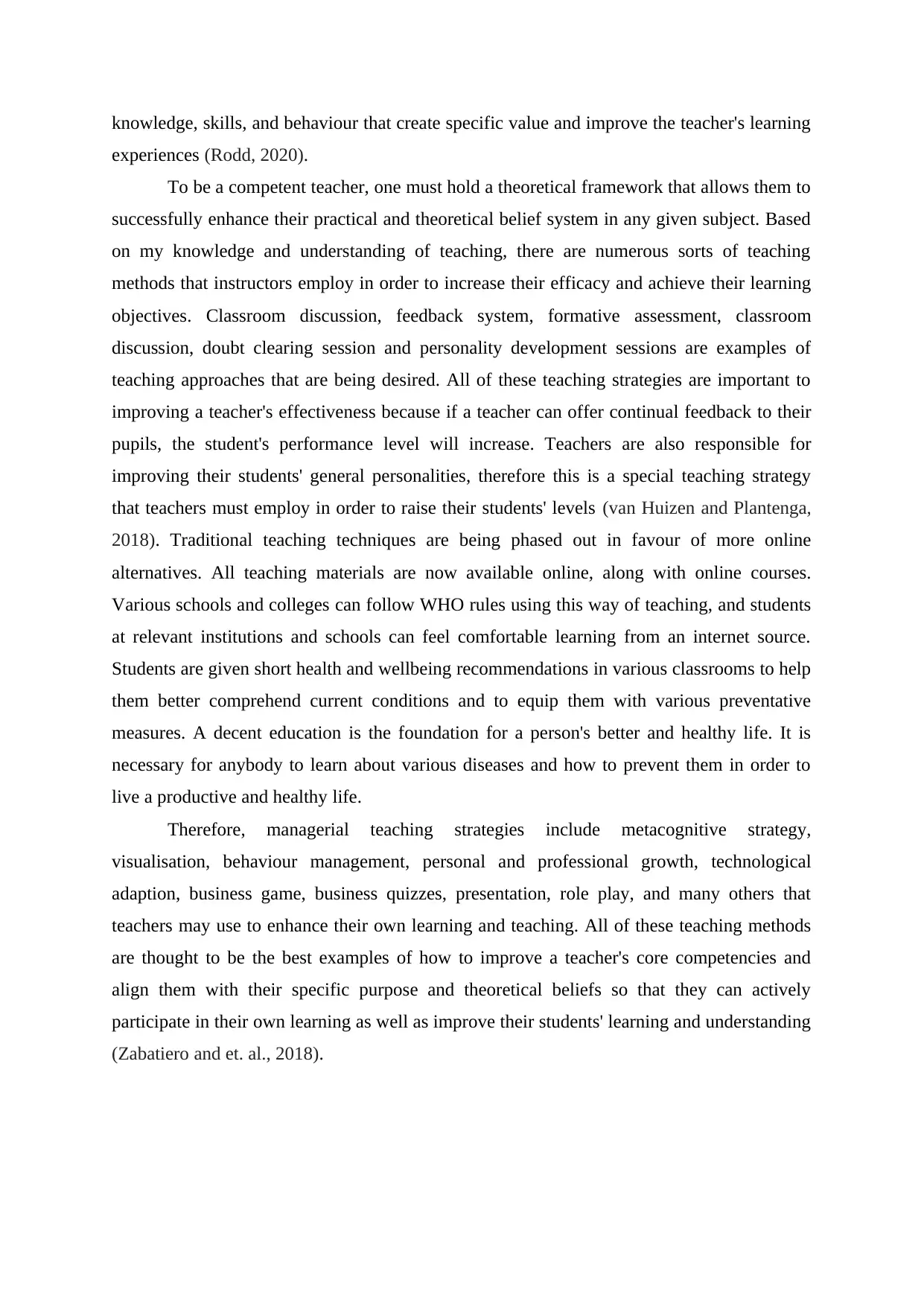
knowledge, skills, and behaviour that create specific value and improve the teacher's learning
experiences (Rodd, 2020).
To be a competent teacher, one must hold a theoretical framework that allows them to
successfully enhance their practical and theoretical belief system in any given subject. Based
on my knowledge and understanding of teaching, there are numerous sorts of teaching
methods that instructors employ in order to increase their efficacy and achieve their learning
objectives. Classroom discussion, feedback system, formative assessment, classroom
discussion, doubt clearing session and personality development sessions are examples of
teaching approaches that are being desired. All of these teaching strategies are important to
improving a teacher's effectiveness because if a teacher can offer continual feedback to their
pupils, the student's performance level will increase. Teachers are also responsible for
improving their students' general personalities, therefore this is a special teaching strategy
that teachers must employ in order to raise their students' levels (van Huizen and Plantenga,
2018). Traditional teaching techniques are being phased out in favour of more online
alternatives. All teaching materials are now available online, along with online courses.
Various schools and colleges can follow WHO rules using this way of teaching, and students
at relevant institutions and schools can feel comfortable learning from an internet source.
Students are given short health and wellbeing recommendations in various classrooms to help
them better comprehend current conditions and to equip them with various preventative
measures. A decent education is the foundation for a person's better and healthy life. It is
necessary for anybody to learn about various diseases and how to prevent them in order to
live a productive and healthy life.
Therefore, managerial teaching strategies include metacognitive strategy,
visualisation, behaviour management, personal and professional growth, technological
adaption, business game, business quizzes, presentation, role play, and many others that
teachers may use to enhance their own learning and teaching. All of these teaching methods
are thought to be the best examples of how to improve a teacher's core competencies and
align them with their specific purpose and theoretical beliefs so that they can actively
participate in their own learning as well as improve their students' learning and understanding
(Zabatiero and et. al., 2018).
experiences (Rodd, 2020).
To be a competent teacher, one must hold a theoretical framework that allows them to
successfully enhance their practical and theoretical belief system in any given subject. Based
on my knowledge and understanding of teaching, there are numerous sorts of teaching
methods that instructors employ in order to increase their efficacy and achieve their learning
objectives. Classroom discussion, feedback system, formative assessment, classroom
discussion, doubt clearing session and personality development sessions are examples of
teaching approaches that are being desired. All of these teaching strategies are important to
improving a teacher's effectiveness because if a teacher can offer continual feedback to their
pupils, the student's performance level will increase. Teachers are also responsible for
improving their students' general personalities, therefore this is a special teaching strategy
that teachers must employ in order to raise their students' levels (van Huizen and Plantenga,
2018). Traditional teaching techniques are being phased out in favour of more online
alternatives. All teaching materials are now available online, along with online courses.
Various schools and colleges can follow WHO rules using this way of teaching, and students
at relevant institutions and schools can feel comfortable learning from an internet source.
Students are given short health and wellbeing recommendations in various classrooms to help
them better comprehend current conditions and to equip them with various preventative
measures. A decent education is the foundation for a person's better and healthy life. It is
necessary for anybody to learn about various diseases and how to prevent them in order to
live a productive and healthy life.
Therefore, managerial teaching strategies include metacognitive strategy,
visualisation, behaviour management, personal and professional growth, technological
adaption, business game, business quizzes, presentation, role play, and many others that
teachers may use to enhance their own learning and teaching. All of these teaching methods
are thought to be the best examples of how to improve a teacher's core competencies and
align them with their specific purpose and theoretical beliefs so that they can actively
participate in their own learning as well as improve their students' learning and understanding
(Zabatiero and et. al., 2018).
Paraphrase This Document
Need a fresh take? Get an instant paraphrase of this document with our AI Paraphraser
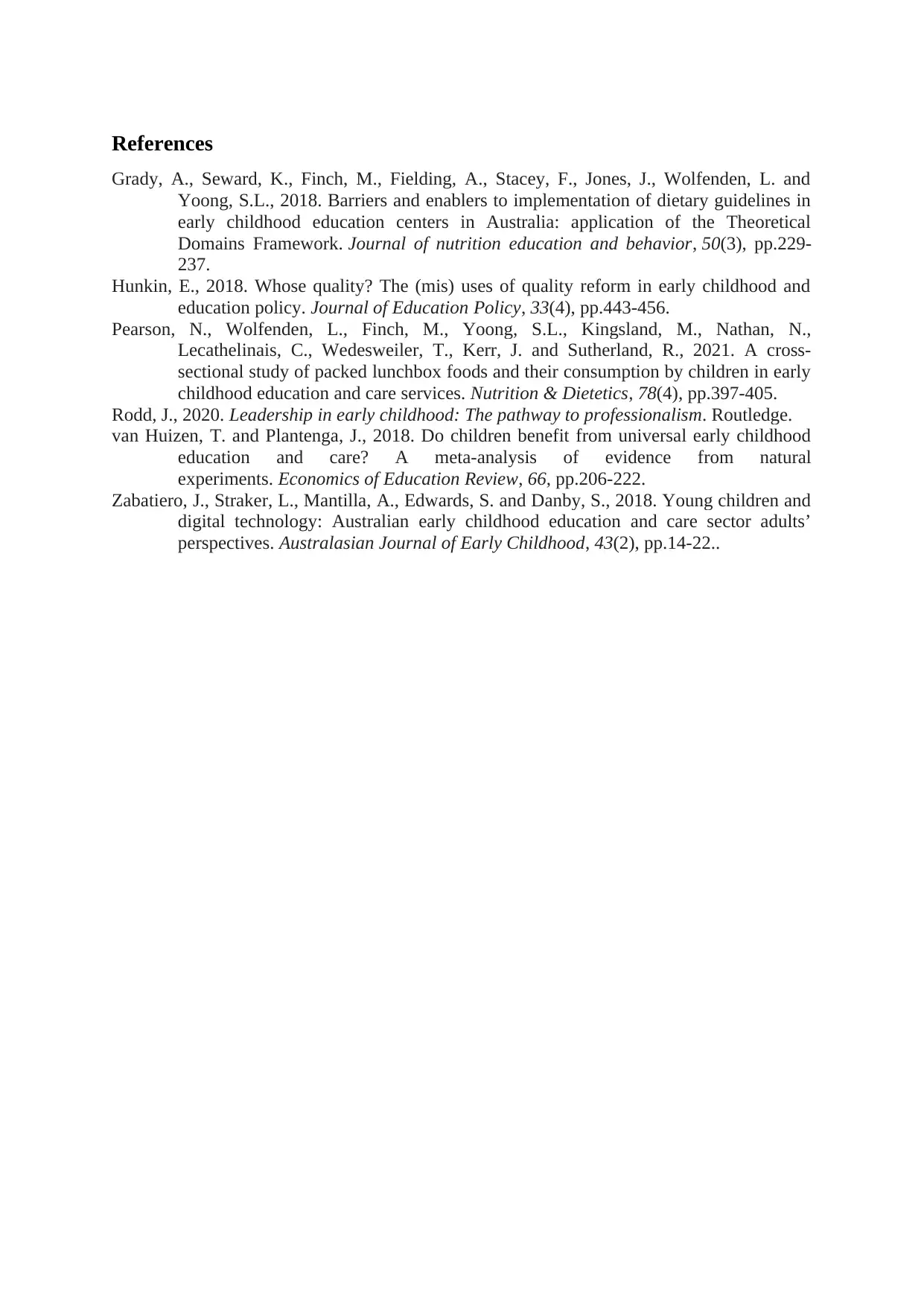
References
Grady, A., Seward, K., Finch, M., Fielding, A., Stacey, F., Jones, J., Wolfenden, L. and
Yoong, S.L., 2018. Barriers and enablers to implementation of dietary guidelines in
early childhood education centers in Australia: application of the Theoretical
Domains Framework. Journal of nutrition education and behavior, 50(3), pp.229-
237.
Hunkin, E., 2018. Whose quality? The (mis) uses of quality reform in early childhood and
education policy. Journal of Education Policy, 33(4), pp.443-456.
Pearson, N., Wolfenden, L., Finch, M., Yoong, S.L., Kingsland, M., Nathan, N.,
Lecathelinais, C., Wedesweiler, T., Kerr, J. and Sutherland, R., 2021. A cross‐
sectional study of packed lunchbox foods and their consumption by children in early
childhood education and care services. Nutrition & Dietetics, 78(4), pp.397-405.
Rodd, J., 2020. Leadership in early childhood: The pathway to professionalism. Routledge.
van Huizen, T. and Plantenga, J., 2018. Do children benefit from universal early childhood
education and care? A meta-analysis of evidence from natural
experiments. Economics of Education Review, 66, pp.206-222.
Zabatiero, J., Straker, L., Mantilla, A., Edwards, S. and Danby, S., 2018. Young children and
digital technology: Australian early childhood education and care sector adults’
perspectives. Australasian Journal of Early Childhood, 43(2), pp.14-22..
Grady, A., Seward, K., Finch, M., Fielding, A., Stacey, F., Jones, J., Wolfenden, L. and
Yoong, S.L., 2018. Barriers and enablers to implementation of dietary guidelines in
early childhood education centers in Australia: application of the Theoretical
Domains Framework. Journal of nutrition education and behavior, 50(3), pp.229-
237.
Hunkin, E., 2018. Whose quality? The (mis) uses of quality reform in early childhood and
education policy. Journal of Education Policy, 33(4), pp.443-456.
Pearson, N., Wolfenden, L., Finch, M., Yoong, S.L., Kingsland, M., Nathan, N.,
Lecathelinais, C., Wedesweiler, T., Kerr, J. and Sutherland, R., 2021. A cross‐
sectional study of packed lunchbox foods and their consumption by children in early
childhood education and care services. Nutrition & Dietetics, 78(4), pp.397-405.
Rodd, J., 2020. Leadership in early childhood: The pathway to professionalism. Routledge.
van Huizen, T. and Plantenga, J., 2018. Do children benefit from universal early childhood
education and care? A meta-analysis of evidence from natural
experiments. Economics of Education Review, 66, pp.206-222.
Zabatiero, J., Straker, L., Mantilla, A., Edwards, S. and Danby, S., 2018. Young children and
digital technology: Australian early childhood education and care sector adults’
perspectives. Australasian Journal of Early Childhood, 43(2), pp.14-22..
1 out of 5
Related Documents
Your All-in-One AI-Powered Toolkit for Academic Success.
+13062052269
info@desklib.com
Available 24*7 on WhatsApp / Email
![[object Object]](/_next/static/media/star-bottom.7253800d.svg)
Unlock your academic potential
Copyright © 2020–2026 A2Z Services. All Rights Reserved. Developed and managed by ZUCOL.





